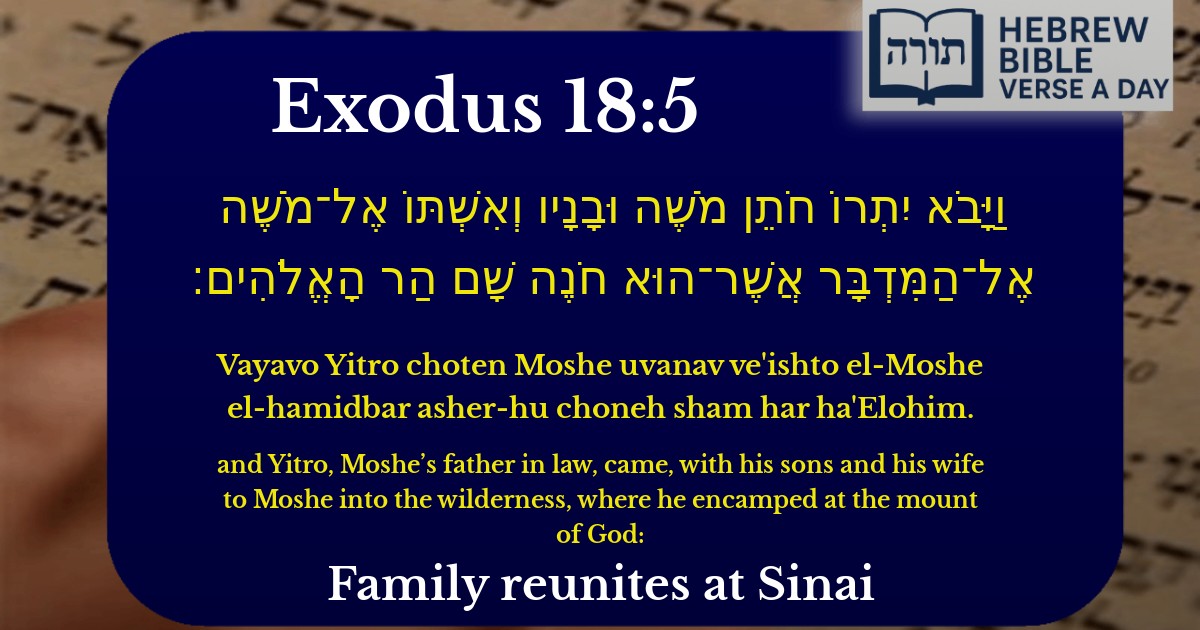Join Our Newsletter To Be Informed When New Videos Are Posted
Join the thousands of fellow Studends who rely on our videos to learn how to read the bible in Hebrew for free!
Hebrew Text
וַיָּבֹא יִתְרוֹ חֹתֵן מֹשֶׁה וּבָנָיו וְאִשְׁתּוֹ אֶל־מֹשֶׁה אֶל־הַמִּדְבָּר אֲשֶׁר־הוּא חֹנֶה שָׁם הַר הָאֱלֹהִים׃
English Translation
and Yitro, Moshe’s father in law, came, with his sons and his wife to Moshe into the wilderness, where he encamped at the mount of God:
Transliteration
Vayavo Yitro choten Moshe uvanav ve'ishto el-Moshe el-hamidbar asher-hu choneh sham har ha'Elohim.
Hebrew Leining Text
וַיָּבֹ֞א יִתְר֨וֹ חֹתֵ֥ן מֹשֶׁ֛ה וּבָנָ֥יו וְאִשְׁתּ֖וֹ אֶל־מֹשֶׁ֑ה אֶל־הַמִּדְבָּ֗ר אֲשֶׁר־ה֛וּא חֹנֶ֥ה שָׁ֖ם הַ֥ר הָאֱלֹהִֽים׃
וַיָּבֹ֞א יִתְר֨וֹ חֹתֵ֥ן מֹשֶׁ֛ה וּבָנָ֥יו וְאִשְׁתּ֖וֹ אֶל־מֹשֶׁ֑ה אֶל־הַמִּדְבָּ֗ר אֲשֶׁר־ה֛וּא חֹנֶ֥ה שָׁ֖ם הַ֥ר הָאֱלֹהִֽים׃
🎵 Listen to leining
Parasha Commentary
📚 Talmud Citations
This verse is quoted in the Talmud.
📖 Zevachim 116a
The verse is cited in a discussion about the location where Moses received the Torah and the significance of Mount Sinai.
📖 Sanhedrin 94a
Mentioned in the context of discussions about Jethro's conversion and his arrival to meet Moses.


Yitro's Arrival at Har HaElokim
The verse describes Yitro, Moshe's father-in-law, coming to the wilderness where Moshe was encamped near Har HaElokim (the Mountain of God). Rashi (Shemot 18:5) explains that this mountain is Har Sinai, though it is not yet named as such in the Torah at this point. The term "Har HaElokim" hints at its future sanctity as the place of Matan Torah.
The Significance of Yitro's Journey
Ramban (Shemot 18:1) notes that Yitro's arrival was a significant event, as it demonstrated his recognition of Hashem's greatness after hearing about the miracles of Yetziat Mitzrayim and Krias Yam Suf. The Midrash (Mechilta Yitro 1) states that Yitro was one of three advisors to Pharaoh (alongside Iyov and Bilam), and his decision to join Bnei Yisrael showed his complete rejection of idolatry.
The Mention of Moshe's Family
The verse mentions that Yitro came with Moshe's wife (Tziporah) and sons. Ibn Ezra (Shemot 18:2) explains that Moshe had sent his family back to Midyan during the turmoil in Egypt, and they now rejoined him. The Talmud (Zevachim 116a) discusses how Yitro's arrival with Moshe's family demonstrated his concern for their welfare and his desire to reunite them.
The Location: "Where He Encamped"
The phrase "where he encamped" (asher hu choneh sham) is interpreted by Sforno as emphasizing that this was Moshe's personal encampment, separate from the main Israelite camp. This may indicate that Moshe maintained a degree of separation to preserve his prophetic state, as suggested by the Netziv in Ha'amek Davar.